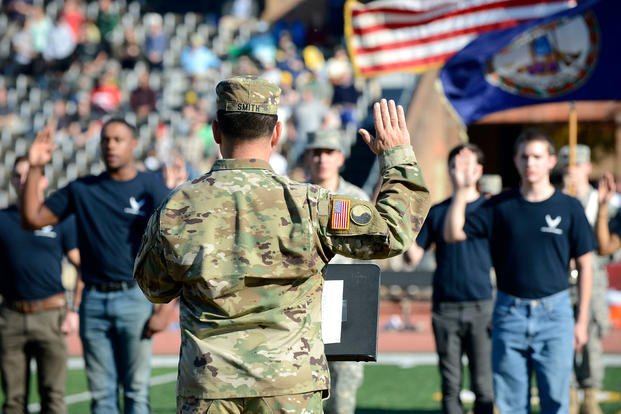The opinions expressed in this op-ed are those of the authors and do not necessarily reflect the views of Military.com. If you would like to submit your own commentary, please send your article to opinions@military.com for consideration.
Military recruiting shortfalls threaten our national security during a critical time as two wars that could quickly escalate are being waged.
Why aren't high school and college students today considering a career or even a term in the military? As veterans of the Army and Navy, we know the value of service and the diverse skills and backgrounds of our fellow service members, including people from every community, ethnicity and economic status, united in their commitment to support and defend the United States.
The Army, Navy, Air Force and Coast Guard all missed their recruiting targets last year, while the Marine Corps and Space Force narrowly met theirs. The National Guard is seeing shortages at all ranks and in all states.
Employers and universities can help address our recruiting shortfalls by providing transition assistance to those who have served our nation. We need to ensure young people feel confident about their military training and service and highlight how it leads to quality post-military careers and the opportunity to attend college and earn a first or advanced degree.
More young people will take the step to join and serve when they understand how incredibly valuable military service is for personal and professional development.
Wherever they are assigned -- in a helicopter squadron, on a ship, or as part of a cyber or drone crew -- today's military members learn new cutting-edge skills. They learn hard technical skills required for their position, and the more nuanced soft skills that are critical in today's competitive workplaces. Military service members know how to plan, be flexible, reliable, dependable and accountable. They also know how to work as part of a team.
Integrity, discipline and the ability to get along with others are not buzzwords when you're living in close quarters and training to fight and defend your country. These are the ethos of military service and the values that give life purpose, meaning, focus and direction.
By the time a service member decides to leave the military, they have experienced and practiced different leadership styles and been assigned tremendous responsibility for people and equipment, often under arduous conditions and in austere and even hostile environments. They have an ingrained sense of purpose and commitment to mission success that is in their DNA.
These experiences don't often translate into neat resumé bullets. It can be hard to summarize acquired skills and experiences, as well as articulate value and grit, especially when automation and keywords drive a talent search. That's why it's important for corporations and universities to build military talent connection pipelines.
With the right coaching, mentorship, education and training on how to apply their skills to new environments, veterans have the potential to transform companies and communities. As leaders, we can set goals to accelerate veteran transition, provide avenues to launch veterans on corporate career pathways, and build a mentorship pipeline between C-suite leaders and transitioning military members.
Forming partnerships to stake out pathways for veterans is one way to highlight the value of military service as well as to improve corporate bottom lines and talent pools. We can inspire the next round of military recruits and encourage support for their decision to join with an even brighter future following their service.
At PenFed, our Military Employment Program offers comprehensive support for transitioning service members and their families. At William & Mary, we have developed a specialized Veteran to Executive Transition (VET) class for high-performing transitioning military members.
As Americans, we have a shared interest in maintaining a strong military to ensure our national defense. As leaders at corporations and universities, we have the power to inspire the next generation of young people who will defend our freedom and continue to serve as leaders throughout their careers. Military talent brings incredible value to our organizations, and we encourage leaders to support and hire our nation's veterans. It's both an investment in your institution and our national security.
-- James R. Schenck is the president and CEO of PenFed Credit Union and CEO of the PenFed Foundation. He is a U.S. Military Academy graduate and served as a Black Hawk helicopter pilot in the U.S. Army.
-- Kathleen T. Jabs is special assistant to the president for military and veterans affairs at William & Mary. The former acting secretary of veterans and defense affairs for the Commonwealth of Virginia, she is a U.S. Naval Academy graduate and retired Navy captain.











